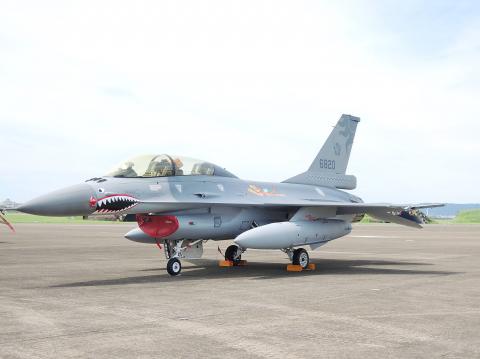The upgrade of Taiwan’s fleet of Lockheed Martin F-16A/B fighter jets with new electronic countermeasures (ECM) pods has begun on a small scale, the air force said yesterday.
The upgrade is to improve the planes’ air-to-air and air-to-ground surveillance capabilities and combat capability to meet the needs of advanced warfare.
The fleet has 80 AN/ALQ-184(V) ECM pods and the air force has earmarked US$160 million to purchase 42 new ALQ-131A FMS pods that the US army has been developing to replace the old pods, but it would now only be able to buy 12 FMS pods for that budget due to increased research and development costs, the air force said.

Photo: Lo Tien-bin, Taipei Times
The air force plans to outfit the F-16 fleet with the new FMS pod, which can be integrated with the jets’ combat systems and fit with the air force’s logistical planning, it said.
Development and testing of the new pods have been completed and they are being produced in small batches, but further upgrades are possible, the air force added.
The procurement was in accordance with the Government Procurement Act (政府採購法), military procurement regulations and the US Department of Defense’s Security Assistance Management Manual, the air force said, denying local media reports that it plans to amortize the procurement expense over several fiscal years.
It said the upgrade is in accordance with a January 2012 legislative resolution stipulating that the air force “should procure the same equipment used by the US Air Force to ensure consistency in weapons deployment and maintenance with the US Air Force and to ensure government spending efficiency.”
In other news, the Web site of the National Security Bureau (NSB) has been hit by a rising number of cyberattacks since President Tsai Ing-wen (蔡英文) assumed office in May last year, according to a report.
The Web site experienced 17,659 cyberattacks over the first half of last year, the NSB said in a report included as part of its budget proposal for next year, which it has submitted to the Legislative Yuan for approval.
The figures for January to June last year almost exceeded the 19,826 attacks it withstood in the whole of 2015, the report said.
Hacking attempts have also risen sharply since Tsai assumed office on May 20 last year, it added.
The number of hacking attempts rose to 613,789 between July and December last year, or an average of 102,298 attempts per month, the report said, adding that this represented a sharp increase from previous years.
However, it said hacking attempts have gradually declined this year, dropping to 108,069 from January to June.
All attempts have been detected and successfully blocked, the bureau said in its budget proposal.
Although the bureau did not specify the origins of the attacks, they are suspected to mostly come from China, as the NSB is a major target for Chinese military and civilian hackers.
The bureau said it has continued to shore up its cyberdefense capabilities in the face of the attacks.
More personnel and resources have also been allocated to increase the agency’s digital counter-attack capabilities and to regularly update its computer security system, the bureau said.

The manufacture of the remaining 28 M1A2T Abrams tanks Taiwan purchased from the US has recently been completed, and they are expected to be delivered within the next one to two months, a source said yesterday. The Ministry of National Defense is arranging cargo ships to transport the tanks to Taiwan as soon as possible, said the source, who is familiar with the matter. The estimated arrival time ranges from late this month to early next month, the source said. The 28 Abrams tanks make up the third and final batch of a total of 108 tanks, valued at about NT$40.5 billion

A group from the Taiwanese Designers in Australia association yesterday represented Taiwan at the Midsumma Pride March in Melbourne. The march, held in the St. Kilda suburb, is the city’s largest LGBTQIA+ parade and the flagship event of the annual Midsumma Festival. It attracted more than 45,000 spectators who supported the 400 groups and 10,000 marchers that participated this year, the association said. Taiwanese Designers said they organized a team to march for Taiwan this year, joining politicians, government agencies, professionals and community organizations in showing support for LGBTQIA+ people and diverse communities. As the first country in Asia to legalize same-sex

MOTIVES QUESTIONED The PLA considers Xi’s policies toward Taiwan to be driven by personal considerations rather than military assessment, the Epoch Times reports Chinese President Xi Jinping’s (習近平) latest purge of the Chinese People’s Liberation Army (PLA) leadership might have been prompted by the military’s opposition to plans of invading Taiwan, the Epoch Times said. The Chinese military opposes waging war against Taiwan by a large consensus, putting it at odds with Xi’s vision, the Falun Gong-affiliated daily said in a report on Thursday, citing anonymous sources with insight into the PLA’s inner workings. The opposition is not the opinion of a few generals, but a widely shared view among the PLA cadre, the Epoch Times cited them as saying. “Chinese forces know full well that

Travel agencies in Taiwan are working to secure alternative flights for travelers bound for New Zealand for the Lunar New Year holiday, as Air New Zealand workers are set to strike next week. The airline said that it has confirmed that the planned industrial action by its international wide-body cabin crew would go ahead on Thursday and Friday next week. While the Auckland-based carrier pledged to take reasonable measures to mitigate the impact of the workers’ strike, an Air New Zealand flight arriving at Taipei from Auckland on Thursday and another flight departing from Taipei for Auckland on Saturday would have to